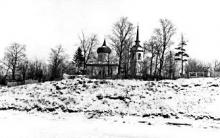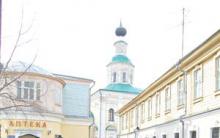Article menu:
“In a Bad Society” is a story by a Russian writer of Ukrainian origin, Vladimir Korolenko, which was first published in 1885 in the tenth issue of the magazine “Mysl”. Later the work was included in the collection “Essays and Stories.” This work, small in volume but significant in its semantic load, can undoubtedly be considered one of the best in the creative heritage of the famous writer and human rights activist.
Plot
The story was written from the perspective of a six-year-old boy Vasya, the son of a judge in the city of Knyazhye-Veno. The child’s mother died early, leaving him and his younger sister Sonya half orphans. After the loss, the father distanced himself from his son, concentrating all his love and affection on his little daughter. Such circumstances could not pass without a trace in Vasya’s soul: the boy is looking for understanding and warmth, and unexpectedly finds them in “bad society”, having made friends with the children of the tramp and thief Tyburtsy Drab, Valik and Marusya.
Fate brought the children together completely unexpectedly, but Vasya’s attachment to Valik and Marusa turned out to be so strong that it was not hindered by either the unexpected news that his new friends were tramps and thieves, or the acquaintance with their seemingly menacing father. Six-year-old Vasya does not miss the opportunity to see his friends, and his love for his sister Sonya, with whom the nanny does not allow him to play, transfers to little Marusya.

Another shock that worried the child was the news that little Marusya was seriously ill: some “gray stone” was taking away her strength. The reader understands what kind of gray stone it can be, and what a terrible disease often accompanies poverty, but for the mind of a six-year-old child, who perceives everything literally, the gray stone appears in the form of a cave where children live, so he tries to get them out into the fresh air as often as possible air. Of course, this doesn't help much. The girl is weakening before our eyes, and Vasya and Valik are trying to somehow bring a smile to her pale face.
The culmination of the story is the story of the doll that Vasya asked from his sister Sonya to please Marusya. A beautiful doll, a gift from a deceased mother, is not able to cure the baby, but it brings her short-term joy.

They notice a missing doll in the house, the father does not let Vasya leave the house, demanding an explanation, but the boy does not break his word to Valik and Tyburtsy and does not tell anything about the tramps. At the moment of the most intense conversation, Tyburtsy appears in the judge’s house with a doll in his hands and the news that Marusya has died. This tragic news softens Father Vasya, and shows him from a completely different side: as a sensitive and sympathetic person. He lets his son go to marry Marusya, and the nature of their communication changes after this story.
Even as the eldest, Vasya does not forget about his little friend, who lived only four years, or about Valik, who, after the death of Marusya, suddenly disappeared along with Tyburtsy. She and her sister Sonya regularly visit the grave of a little blond girl who loved to sort through flowers.

Characteristics
Speaking about the heroes who appear before us on the pages of the story, first of all we should, of course, dwell on the image of the narrator, because all events are presented through the prism of his perception. Vasya is a six-year-old child, on whose shoulders a burden has fallen that is too heavy for his age: the death of his mother.
Those few warm memories of the boy’s dearest person make it clear that the boy loved his mother very much, and suffered the loss hard. Another challenge for him was the alienation of his father and the inability to play with his sister. The child gets lost, meets tramps, but even in this society he remains himself: every time he tries to bring Valik and Marusya something tasty, he perceives Marusya as his own sister, and Valik as his brother. This very young boy is not devoid of perseverance and honor: he does not break under the pressure of his father and does not break his word. Another positive feature that complements the artistic portrait of our hero is that he did not take the doll from Sonya secretly, did not steal it, did not take it away by force: Vasya told his sister about poor sick Marusa, and Sonya herself allowed him to take the doll.
Valik and Marusya appear before us in the story as real children of the dungeon (by the way, V. Korolenko himself did not like the shortened version of his story of the same name).
These children did not deserve the fate that fate had prepared for them, and they perceive everything with adult seriousness, and, at the same time, childish simplicity. What in Vasya’s understanding is designated as “bad” (the same as theft), for Valik it is an ordinary everyday thing that he is forced to do so that his sister does not go hungry.
The example of children shows us that for true sincere friendship, origin, financial status and other external factors do not matter. It's important to remain human.
The opposites in the story are the fathers of the children.
Tyburtsy- a beggar thief whose origins evoke legends. A person who combines education and a peasant, non-aristocratic appearance. Despite this, he loves Valik and Marusya very much and allows Vasya to come to his children.
Vasya's father- a respectable man in the city, famous not only for his occupation, but also for his justice. At the same time, he closes himself off from his son, and often the thought flashes in Vasya’s head that his father doesn’t love him at all. The relationship between father and son changes after Marusya's death.
It is also worth noting that the prototype of Vasya’s father in the story was Vladimir Korolenko’s father: Galaktion Afanasyevich Korolenko was a reserved and stern man, but at the same time incorruptible and fair. This is exactly how the hero of the story “In Bad Society” appears.
A special place in the story is given to the tramps, led by Tyburtsy.
Professor, Lavrovsky, Turkevich - these characters are not the main ones, but they perform an important role for the artistic design of the story: they present a picture of the vagabond society into which Vasya ends up. By the way, these characters evoke pity: the portrait of each of them shows that every person, broken by a life situation, can slide into vagrancy and theft. These characters do not evoke negative feelings: the author wants the reader to sympathize with them.
Two places are vividly described in the story: the city of Knyazhye-Veno, the prototype of which was Rivne, and the old castle, which became a haven for the poor. The prototype of the castle was the palace of the Lubomirsky princes in the city of Rivne, which during the time of Korolenko actually served as a haven for beggars and vagabonds. The city and its inhabitants appear in the story as a gray and boring picture. The main architectural decoration of the city is the prison - and this small detail already gives a clear description of the place: there is nothing remarkable in the city.
Conclusion
“In Bad Society” is a short story that presents us with just a few episodes from the lives of the heroes, just one tragedy of a life cut short, but it is so vivid and vital that it touches the invisible strings of the soul of every reader. Without a doubt, this story by Vladimir Korolenko is worth reading and experiencing.
“In Bad Society” - a summary of the story by Vladimir Korolenko
4.8 (96%) 5 votesTypically, schoolchildren study the work of Viktor Korolenko as part of the program, so writing an essay based on the story “In Bad Society” by Korolenko is an integral part of the educational process. We will now briefly look at the plot of the story, talk about the main character and, in general, perform an analysis of the story “In a Bad Society.”
Plot of the story
On our website you can read a summary of “In Bad Society,” but, nevertheless, let’s briefly analyze the plot now. The main character's name is Vasya, he has a younger sister, and the children live with their father, having been left without a mother at an early age. The father, however, loves the younger Sonya more, but pays almost no attention to Vasya. And then one day Vasya and the boys come across the ruins of an ancient chapel, where an old crypt is abandoned nearby. Mention of this must be included in the essay on the story “In Bad Society” by Korolenko. It turns out that people live in this crypt - they lead the existence of beggars and all of strange origin.
Vasya, whom his friends had long abandoned alone near the chapel, became friends with a boy named Valek. He also has a younger sister who is sick and cannot be cured due to poverty. This acquaintance is key in the analysis of the story “In a Bad Society”, because after this Vasya learns about the father of the children and the leader of the “bad” society - Tyburtsia Drab. This is a mysterious man, many are afraid of him, because despite his good education, his behavior resembles some kind of sorcerer. Drab is against communication between children, but the guys do not abandon their friendship.
Further events develop in such a way that Vasya and his dad, after all, improve their relationship, although this is preceded by sad events - Marusya dies without identifying herself. Since Vasya brought her his sister’s doll, Tyburtsy subsequently goes to Vasya’s father to thank him for his son. When preparing an essay on the story “In Bad Society,” do not forget to provide a number of quotes that more fully reveal the key episodes.
A little about the main character
Thanks to the analysis of “In a Bad Society,” you will notice what character traits are inherent in the main character Vasya. He is brave, kind, sympathetic and generous. The poverty of his new acquaintances did not alienate them; on the contrary, these people became his friends. Of course, Vasya is still very young, and largely for this reason, social status does not play any role for him. Valek, for example, is a beggar. And Vasya’s father has a respected position - he is a well-known judge in the city. But the main character Vasya does not look at this difference in status.
It must be said that Vasya never cared about food, but when his new friends needed food, he stepped into their position and more than once supplied Valka and Marusya with apples. Soon Vasya finds out that Valek is ready to steal for food for his sister, but he does not condemn him. We can conclude that the main character Vasya was not afraid of “bad” society, his friendship is from the bottom of his heart, sincere and real.
Conclusions in the analysis of the story "In Bad Society"
Although this work is most often studied in the fifth grade, it is no secret that the story is interesting to everyone: both children and adults. If any adults didn't read it when they were young, it's definitely worth spending a little time catching up. After all, Korolenko described a strong, true friendship that you don’t see often, but it exists. And it’s unlikely that anyone will remain indifferent after reading this story.
It doesn’t matter whether you are writing an essay on the story “In Bad Society,” or just want to learn something useful for yourself, note the following: the main character Vasya has radically changed his attitude not only towards his own father, but also towards himself. He realized that he was capable of being responsive and kind, understanding and loving.
We hope that the analysis of the story “In Bad Society” by Korolenko was useful for you, visit our Blog more often - there are many articles on literature and analyzes of works.
Korolenko's work In a Bad Society dates back to 1885. Children become familiar with this work through the curriculum, and write down their thoughts and views in their reading diary, where Korolenko also found his place with his work In Bad Society. For those who do not find time to get acquainted with Korolenko’s story in its entirety, we offer you to get acquainted with a brief retelling.
Korolenko In bad company
Chapter 1
Here is a castle that is located on an island near Prince Town. Vasily, the nine-year-old character in the story Queen In Bad Society, lives in Prince Town. The boy was raised by his father. The father very rarely communicates with his son, only sometimes he could kiss his daughter, Vasya’s sister, and that’s because she reminded him of his wife. Vasya often left home and headed to the castle, which attracted and beckoned him.
Beggars live in the castle, but over time, changes came and Janusz, a former servant of the count, who got the right to decide who will live in the castle and who to drive away, drives out all the beggars.
Chapter 2
The exiled people roam and wander around the city, and then disappear. But not from the city. People just found a place to live. They settled in the dungeon of the chapel. Tyburtsy, who had an adopted son and daughter, became the head of the beggars, and their names were Marusya and Valek.
Chapter 3
Here we learn about the relationship between father and son. But they were none. Vasya lives on his own, and because of his father’s constant stern appearance, he tried to avoid meeting him, so he ran out into the street early in the morning and returned very late
The boy often remembers his mother, her tender embrace, and then cries bitterly, because at the age of six he had already experienced a feeling of loneliness. Vasya has a sister and they love each other, but Sonya's nanny did not allow Vasya to play with his sister, so he began to wander.
If Vasya was previously attracted to the castle, now that beggars do not live there, he began to look for new places and now he is attracted to the chapel, which he wants to explore from the inside.
Chapter 4
Vasya and his friends go to the chapel. They help the boy get into the chapel through the window, but his friends, hearing incomprehensible sounds, abandoned Vasya and ran away. Vasya met children in the chapel, those same named children of Tyburtius. The children also invite Vasya to visit and ask him not to disclose his acquaintance with them.
Chapter 5
Vasya is friends with Marusya and Valek. Vasya notices Marusya’s weakness and pale appearance, while his sister is plump and neatly dressed. From conversations with the children, Vasya learns that their father was Tyburtsy, who loved them very much. Vasya felt bitter that his relationship with his father was not the same. Meanwhile, Vasya gained pride in his father, because he learned that in the city his father was respected and considered a fair judge.
Chapter 6
Vasya cannot come to the chapel to see the children, since he has not seen the adults leave it. One day Vasya meets Valek in the city, he calls him to his place. On the way, Valek steals a bun for his sister, who is hungry. Vasya at first said that this was bad, but did not condemn his friend. On the contrary, he felt sad for the poor life of his friends.
Chapter 7
When Vasya returned to his friends, the boy runs into Tyburtsy, who recognized Vasya as the son of a judge. He allows him to continue to be friends with his children, only at the same time he asks not to tell anyone about them. Vasya lied to his father for the first time, saying that he was walking in the city. Vasya was afraid that his father would scold him for his connection with bad society.
Chapter 8
Korolenko's story in a bad society continues chapter by chapter with the fact that with the onset of autumn, the girl's illness only worsened. Every day her condition worsened. Vasya now began to come at any time. One day Vasya saw his father talking to Janusz. It was difficult to understand whether it was about beggars or about Vasya. Vasya told Tyburtsy the conversation he overheard, but he said that his father was fair and always acted within the law. Again Vasya felt proud of his father and at the same time sad, because his father did not love his son.
Chapter 9
The girl is very bad. In order to somehow amuse Marusya, Vasya asks his sister for a doll and she agrees to temporarily lend it to Marusya. The girl was delighted with such a gift, she even cheered up. Vasya, on the other hand, started having problems because of the doll.
The father began to suspect something, he forbids his son to leave home, but Vasya runs away. He went to Marusya, who again did not get up and felt very bad. Vasya wanted to take the doll, but the girl started crying. Vasya could not deprive Marusya of her only joy. Returning home, he ran into his father, who again locked him at home, and four days later called him into the office. Vasya was afraid to go, but there was nothing left to do. He admitted that he took the doll with Sonya’s permission, but he didn’t say where he took it, and it’s not known what would have happened, but then Tyburtsy came through the door. He brought a doll. Tyburtsy told the judge everything and he softened; moreover, warmth and love for his son appeared in his eyes. Now Vasya was sure that this look would always be like this. The father lets Vasya say goodbye to Marusya, who died, and gives money so that the boy can give it to Tyburtius Drag on his own behalf.
Conclusion
Having buried his daughter, Tyburtsy and his son disappear in an unknown direction. The chapel collapsed even more and only the grave was green in the spring. Vasya, Sonya and their father came here. Here the children loved to spend their free time, and when they grew up, they made their vows on this grave.
Korolenko The main characters in bad society
In Korolenko's story In a Bad Society, the main characters are Vasya, a boy from a prosperous family, the family of a city judge. He is a brave, kind, smart tomboy of nine years old who lives with his father since his mother died. Due to lack of attention from his father, he constantly wandered. He makes friends with the children of the poor class and associates with members of bad society.
The main character of the story is the boy Vasya, who lives in the small town of Knyazhye-Veno. The town belongs to a seedy Polish family, life here is quiet and calm.
Vasya's mother died when the child was only six years old. The boy's father was grieving the death of his wife. After her death, he began to pay more attention to his daughter, since the girl looked like her mother, and almost forgot about his son.
Vasya was left to his own devices. He spent most of his time on the streets of the town and often looked at the ruins of the old castle, which was located on a small island. Many scary stories have been told about this place. They said that the castle stood on the bones of captured Turks who built it. A Uniate chapel was built next to the castle, but now it stood completely abandoned.
For a long time, people left without a means of subsistence found shelter in the ruins of the castle. Here you could get a free roof over your head, as well as somehow organize your life.
However, changes began in the castle. Former servant Janusz obtained the rights to this building and began to carry out “reforms” here. He left only Catholics in the castle, and mercilessly drove out the rest of the beggars.
II. Problematic natures
After the beggars were driven out of the castle, they walked the streets of the city for several days in search of temporary shelter. The weather these days was unkind to the people; cold rain poured all the time. But soon the beggars stopped bothering the townspeople, and life returned to its usual routine.
Rumors spread throughout the city that those expelled from the castle had found shelter in the ruins of the chapel; they also said that there were underground passages there. The exiles began to periodically appear in the city, but, like the inhabitants of the castle, they no longer asked for alms. They preferred to take what they needed for life themselves. For this, the townspeople were persecuted.
Among the exiles there were extraordinary personalities. For example, a man nicknamed “professor”. He was a harmless man who spent his days wandering around the city muttering something. He could talk for hours on any topic and was very afraid of piercing and cutting objects. This fact amused the local residents, who often mocked the “professor.”
However, the expelled beggars stood for each other. Pan Turkevich and bayonet cadet Zausailov were particularly distinguished by their courage. The latter was enormous in stature and constantly fought with the locals. The Jews suffered the most from Zausailov.
The former official Lavrovsky was called “Mr. Clerk” in the city. His tragedy is connected with the local beauty Anna, with whom young Lavrovsky was madly in love. The girl ran away from her parents' nest with one dragoon officer, after which the official started drinking. Lavrovsky often attributed terrible crimes to himself, for example, the murder of his father. But the townspeople only laughed at his stories.
Lavrovsky fell asleep on the street in any weather. He could have died long ago if the former official had not been under the care of Pan Turkevich, a man of a tough disposition, always drunk and ready for a fight. Turkevich called himself a general; he could easily find money for drinks from local officials.
Another person worthy of attention was Tyburtsy Drab. Outwardly, this gentleman somewhat resembled a monkey, but everyone was amazed by his learning. Drab knew by heart vast passages from the works of Cicero and other ancient authors.
III. Me and my father
After the death of his mother, Vasily’s relationship with his father became difficult. The boy felt that every day the parent cared less and less about his son. His father’s face was always stern, so Vasya preferred to spend as little time as possible at home. He left for the city at dawn and returned late in the evening. If little sister Sonya was not yet asleep, the boy would sneak into her room and the children would play together.
For this lifestyle, Vasily began to be called a tramp, but he was not at all offended by this and tried to think less about what others were saying. The boy loved to dream; it seemed to him that a big and interesting life lay ahead of him.
Sometimes my father asked if Vasya remembered his mother? Of course, he remembered her hands, to which he loved to cuddle at night, he remembered how in the last year of her life she often sat by the window, as if saying goodbye to this world. However, it was difficult for Vasily to tell his father about this, since he was always gloomy and embittered.
Having explored all the city's attractions, the boy became interested in the chapel, which beckoned with its mysteries and promised many new impressions. And soon Vasya decided to get inside this mysterious building.
IV. I'm making a new acquaintance
Vasily decided to carry out his plans together with his friends. The door of the chapel was boarded up, and it was possible to get inside only through the window, which was located quite high above the ground.
Friends helped Vasya climb onto the window frame, but they categorically refused to go down with him. The boy had to do it alone. Below it was dark, eerie and scary, plaster fell down, and the cry of an awakened owl was heard. It seemed to Vasya that he had entered the next world.
Having gotten used to it a little and looked around, our hero heard children's voices, and then saw a boy of about nine and a very small blond girl with blue eyes. These turned out to be the children of Pan Tyburtsy Valek and Marusya.
They escorted Vasily home, and he promised his new acquaintances that he would visit them again soon.
V. The acquaintance continues
Vasily began to often visit Valek and Marusya, and became more and more attached to his new friends. The girl was especially happy about his visits; she gladly accepted gifts.
Vasily compared Marusya with his sister Sonya. In some ways they were similar, even the same age. However, unlike Sonya, Marusya was a weak and sickly girl; she did not like to frolic, like all little children.
This is all from the “gray stones” that suck the last strength out of Marusya. This is roughly how Valek explained his sister’s illness. And their father, Pan Tyburtsy, told him about this. And, according to Valek, Drab loves his children very much. This news especially upset Vasya, since his father was completely different.
VI. Gray Rock Environments
In this chapter, Valek invited Vasya to his home, which turned out to be a damp and dark dungeon. Now it has become obvious that Vasily’s new acquaintances belong to a “bad society”; they are beggars.
The boy also understood what “gray stones” he was talking about. Life in such a dungeon seemed simply terrible to him. Vasya could not stay here even for a few minutes. He asked Valek to quickly take him out into the fresh air.
VII. Pan Tyburtsy appears on stage
Vasya still went to visit Valek and Marusa. When it was warm and sunny, the children played outside, and in inclement weather they went underground. On one of these days, Pan Tyburtsy appeared. At first he treated the guest rudely, but then, upon learning that Vasily was the son of a judge, he softened. Tyburtsy greatly respected the city judge for his principled position.
Then everyone sat down to dinner. Vasya noticed how greedily the children ate meat dishes. Marusya even licked her greasy fingers. The boy understood that life was difficult for the poor, but still condemned them for theft. Vasya was terribly afraid that his father might punish him for his connection with “bad society.”
VIII. in autumn
Autumn came. On rainy days, Marusya’s illness worsened. The girl lay in bed almost all the time. This circumstance greatly upset Vasya; he became even more attached to the baby, trying to take care of her as if he were his sister.
In good weather, Vasya and Valek carried the girl out of the musty dungeon into the fresh air. Here she was better, Marusya came to life for a while. But this state quickly passed.
IX. Doll
Marusya's illness progressed rapidly. The girl never got out of bed and was indifferent to everything. In order to somehow distract Marusya from her illness, Vasya begged his sister for a beautiful doll. This toy became the last and most expensive in the girl’s life. When she was unconscious and no longer recognized anyone, she was still tightly clutching Vasya’s gift in her little hands.
Father found out about the disappearance of Sonya’s doll. He decided to punish his son severely, but Pan Tyburtsy appeared at the judge’s house. The beggar returned the doll and said that Marusya had died. At that moment, Vasily saw his father differently for the first time. He looked at the boy with a kind look.
Conclusion
Tyburtsy and Valek disappeared, the chapel completely collapsed, and Marusya’s grave turned green every spring. Vasya, his father and Sonya often came here.
Title of the work: In bad company
Korolenko Vladimir
Year of writing: 1885
Genre: story
Main characters: Vasya- son of a judge Sonya- Vasya’s sister, Outrigger- son of Tyburtsiy, Marusya- sister Valeka, Tyburtsy- the head of the “bad society”, Vasya's father- city judge.
A piercing and very adult story, which you can get acquainted with through the summary of the story “In Bad Society” for the reader’s diary.











Chicken skewers Chicken skewers with bacon
Mushroom glade salad with honey mushrooms recipe with photos How to prepare mushroom glade salad with honey mushrooms
Very tasty lecho: recipe with carrots
Minced meat for dumplings - preparing hearty meals at home
Honey cake with sour cream